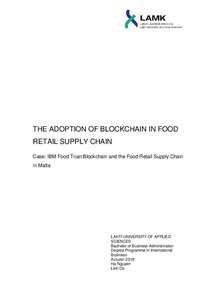The Adoption of Blockchain in Food Retail Supply Chain : Case: IBM Food Trust Blockchain and the Food Retail Supply Chain in Malta
Nguyen, Ha; Do, Linh (2018)
Nguyen, Ha
Do, Linh
Lahden ammattikorkeakoulu
2018
All rights reserved
Julkaisun pysyvä osoite on
https://urn.fi/URN:NBN:fi:amk-2018121321426
https://urn.fi/URN:NBN:fi:amk-2018121321426
Tiivistelmä
The year 2008 witnessed the birth of Bitcoin, a cryptocurrency that has partly kindled the blazing flame of Industry 4.0. As the archetypal representative of this age, blockchain has proven itself to be not only the power behind Bitcoin but also the disruptive technology in numerous fields, including supply chain management. Observing the optimistic changes that blockchain promisingly brings about, the authors decide to pen this thesis to assess the adoption of blockchain in food retail supply chain with the case study as IBM Food Trust Blockchain and the Maltese grocery retailing.
This thesis predominantly employs an abductive approach, supported by a small amount of deduction and processes both qualitative and quantitative data. The theory and empiricism stretch throughout the whole contents. In the theoretical part, readers are provided with the fundamentals of blockchain, food retail supply chain, blockchain-enabled food supply chain, IBM Food Trust, PEST analysis, and the theories of technology acceptance.
In the empirical part, the desk research of the macro-environment and food retail supply chain in Malta is carried out. Further, there are two comprehensive analyses, one for Maltese retailers and one for the country’s end-consumers. While the data of the former are harvested completely online, the data of the latter are amassed through an online survey and face-to-face interviews.
The findings in the thesis lead to the conclusion that it is tolerably feasible to adopt blockchain in the food retail supply chain in Malta mainly due to the supportive macroenvironment, the willingness to use IBM Food Trust of end-consumers and the influence of stakeholders, including end-consumers, on Maltese food retailers. Notwithstanding the positive surface, the actual implementation requires deeper and wider contemplation. Consequently, the authors also furnish the thesis with theoretical and practical implications, as well as suggestions for future research.
This thesis predominantly employs an abductive approach, supported by a small amount of deduction and processes both qualitative and quantitative data. The theory and empiricism stretch throughout the whole contents. In the theoretical part, readers are provided with the fundamentals of blockchain, food retail supply chain, blockchain-enabled food supply chain, IBM Food Trust, PEST analysis, and the theories of technology acceptance.
In the empirical part, the desk research of the macro-environment and food retail supply chain in Malta is carried out. Further, there are two comprehensive analyses, one for Maltese retailers and one for the country’s end-consumers. While the data of the former are harvested completely online, the data of the latter are amassed through an online survey and face-to-face interviews.
The findings in the thesis lead to the conclusion that it is tolerably feasible to adopt blockchain in the food retail supply chain in Malta mainly due to the supportive macroenvironment, the willingness to use IBM Food Trust of end-consumers and the influence of stakeholders, including end-consumers, on Maltese food retailers. Notwithstanding the positive surface, the actual implementation requires deeper and wider contemplation. Consequently, the authors also furnish the thesis with theoretical and practical implications, as well as suggestions for future research.
